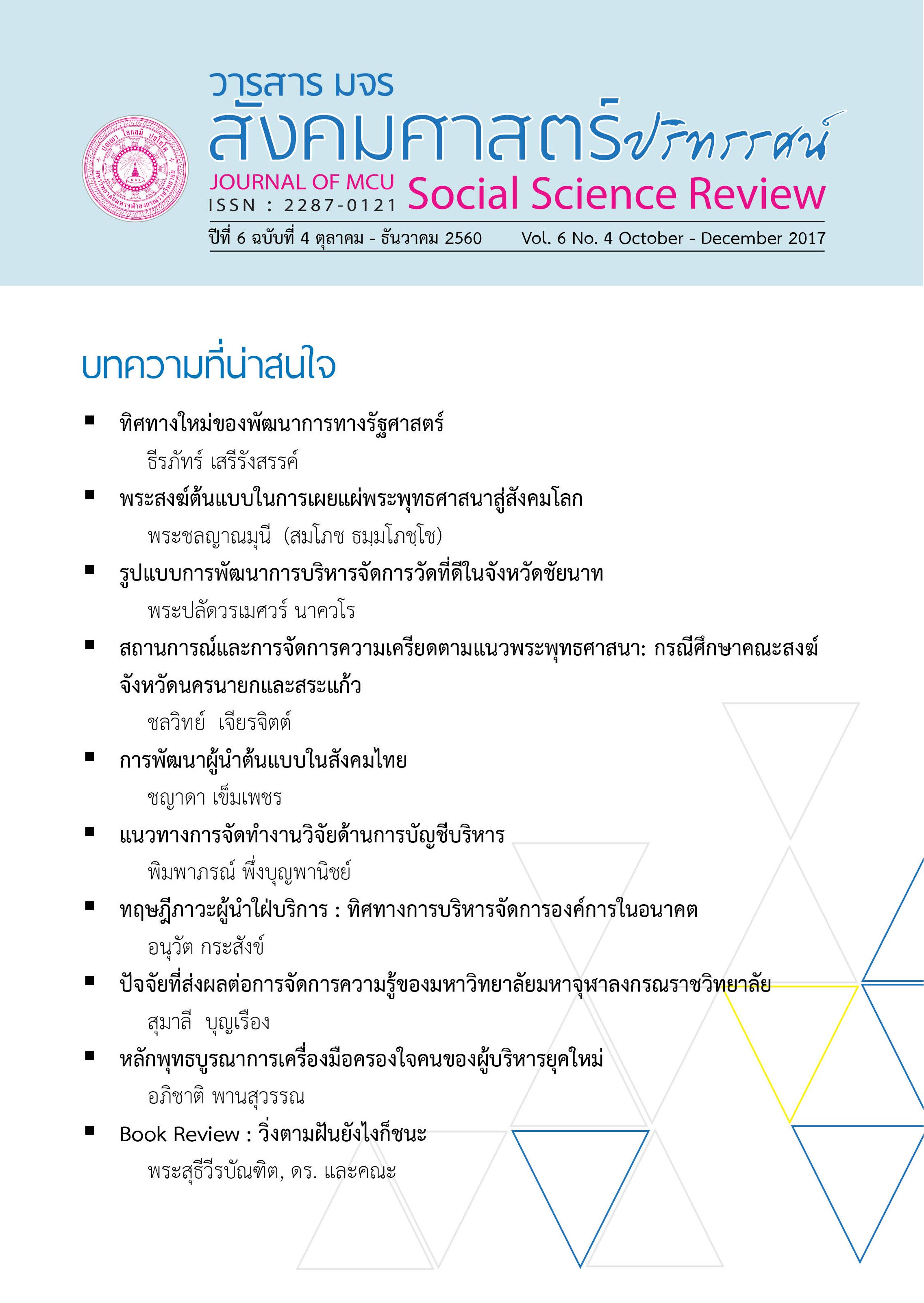รูปแบบภาวะผู้นำทางวิชาการของผู้บริหารสถานศึกษาระดับประถมศึกษาที่ส่งผลต่อประสิทธิผลการจัดการสถานศึกษาในโรงเรียนมาตรฐานสากล สังกัดสำนักงานคณะกรรมการการศึกษาขั้นพื้นฐาน
คำสำคัญ:
ภาวะผู้นำทางวิชาการ; โรงเรียนมาตรฐานสากลบทคัดย่อ
บทความวิจัยนี้ มีวัตถุประสงค์ เพื่อสร้างและตรวจสอบรูปแบบภาวะผู้นาทางวิชาการของผู้บริหารสถานศึกษาระดับประถมศึกษาที่ส่งผลต่อประสิทธิผลการจัดการสถานศึกษาในโรงเรียน
มาตรฐานสากล สังกัดสานักงานคณะกรรมการการศึกษาขั้นพื้นฐาน ประชากรในการวิจัยครั้งนี้ได้แก่ ผู้บริหารสถานศึกษา และรองผู้อานวยการฝ่ายวิชาการหรือหัวหน้างานวิชาการจานวน 406คน และกลุ่มตัวอย่างจานวน 324 คน โดยวิธีการสุ่มแบบหลายขั้นตอน (Multi-stage RandomSampling) เครื่องมือที่ใช้ในการวิจัย คือ แบบสอบถามเรื่องภาวะผู้นาทางวิชาการของผู้บริหารสถานศึกษาระดับประถมศึกษาในโรงเรียนมาตรฐานสากลสังกัดสานักงานคณะกรรมการการศึกษาขั้นพื้นฐาน ซึ่งวิเคราะห์ข้อมูลโดยใช้โปรแกรมสาเร็จรูป LISREL
ผลการวิจัยพบว่า รูปแบบภาวะผู้นาทางวิชาการของผู้บริหารสถานศึกษาระดับประถมศึกษาที่ส่งผลต่อประสิทธิผลการจัดการสถานศึกษาในโรงเรียนมาตรฐานสากล สังกัดสานักงานคณกรรมการการศึกษาขั้นพื้นฐาน ประกอบด้วย ตัวแปรแฝงภายนอก (ExogenousLatent Variables) 1 ตัวแปร คือ ตัวแปรแฝงภาวะผู้นาทางวิชาการ ประกอบด้วยตัวแปรสังเกตได้ 3 ตัวแปร คือ พฤติกรรมการเป็นผู้นาทางวิชาการ การมีส่วนร่วมในการบริหารจัดการ และสมรรถนะของผู้บริหารสถานศึกษา ตัวแปรแฝงภายใน (Endogenous Latent Variables) 1 ตัวแปร
คือ ประสิทธิผลการจัดการสถานศึกษา ประกอบด้วยตัวแปรสังเกตได้ 5 ตัวแปร คือ คุณลักษณะที่พึงประสงค์ของนักเรียน การเป็นคนดี การเป็นคนเก่ง การเป็นคนมีความสุข ความพึงพอใจในการปฏิบัติงานของครูความสาเร็จของงาน และความก้าวหน้าของงาน ผลการตรวจสอบความตรงของโมเดลความสัมพันธ์เชิงสาเหตุของภาวะผู้นาทางวิชาการของผู้บริหารสถานศึกษาที่ส่งผลต่อประสิทธิผลการจัดการสถานศึกษา สังกัดสานักงานการศึกษาขั้นพื้นฐาน พบว่า โมเดลมีความสอดคล้องกลมกลืนกับข้อมูลเชิงประจักษ์ (χ 2= 100.53, df = 67; p = 0.005; GFI = 0.956; AGFI= 0.937 และ RMSR = 0.040 ซึ่งตัวแปรภาวะผู้นาทางวิชาการส่งผลต่อประสิทธิผลการจัดการสถานศึกษา เท่ากับ 0.70
เอกสารอ้างอิง
and Programming (2nd). Mahwah, NJ:Erlbaun.
Cohen, J. M., & Uphoff, N T. (1977). Rural development participation: Concepts And
Measures For Project Design: Implementation and Evaluation. USA : Cornell
University.
Hair, J. F., Anderson, R. E., Tatham, R .L., & Black, W. C. (2006). Multivariate Data
Analysis (6thed). Upper Saddle River, New Jersey : Pearson Education.
Hallinger,P., & Murphy, J. (1985). Assessing the instructional management behavior of
principals. The Elementary School Journal, 86(2), 221-224.
Hoy, W. K., & Miskel, C. G. (1991). Educational Administration : Theory, Research,
And Practice (4th ed.). Singapore : McGraw-Hill.
Krejcie, R. A., & Morgan, D. W. (1970). Determining Sample Size for Research Activities.
Education and Psychological Measurement, 607-609.
Napadech Booncherdchoo. (2552). The Development of A Model of School
Administrators competency Development in Accondance with Education
Professional Standards. (Doctoral Dissertation). Bangkok. Chulalongkorn
University
Prapan Boonwan. (2556). Problem State of International Standard School
Administration of Secondary School Clusters Attached to secondary
Educational Service Area office 34, Mae Hong on province. Journal of
Graduate School, Far Eastern University.
Purkey, S.C.& Smith M.S. (1983). Effective school : A review. The Elementary School
Journal, 83 (4).
Sasiporn Rintha. (2554). Sasiporn Rintha. (2554). Educational Mangement of The
School in World Class Standard School Project : a case Study of
Muangkhong School Under The Secondary Office Educational Service
Area 31. Doctoral Dissertation. Khon Khan. Khon Kan University.
Wantana Naowan. (2558). Leadership Development According to Buddhadhamma of
the Personnels of Phrapiriyaltitham Schools, General Education Section,
Group 3 , Journal of Mou Social Science Review, 4(2), 87-101
ดาวน์โหลด
รูปแบบการอ้างอิง
ฉบับ
ประเภทบทความ
สัญญาอนุญาต
ลิขสิทธิ์ (c) 2017 วารสาร มจร สังคมศาสตร์ปริทรรศน์

อนุญาตภายใต้เงื่อนไข Creative Commons Attribution-NonCommercial-NoDerivatives 4.0 International License.
เพื่อให้เป็นไปตามกฎหมายลิขสิทธิ์ ผู้นิพนธ์ทุกท่านต้องลงลายมือชื่อในแบบฟอร์มใบมอบลิขสิทธิ์บทความให้แก่วารสารฯ พร้อมกับบทความต้นฉบับที่ได้แก้ไขครั้งสุดท้าย นอกจากนี้ ผู้นิพนธ์ทุกท่านต้องยืนยันว่าบทความต้นฉบับที่ส่งมาตีพิมพ์นั้น ได้ส่งมาตีพิมพ์เฉพาะในวารสาร มจร สังคมศาสตร์ปริทรรศน์ เพียงแห่งเดียวเท่านั้น หากมีการใช้ภาพหรือตารางหรือเนื้อหาอื่นๆ ของผู้นิพนธ์อื่นที่ปรากฏในสิ่งตีพิมพ์อื่นมาแล้ว ผู้นิพนธ์ต้องขออนุญาตเจ้าของลิขสิทธิ์ก่อน พร้อมทั้งแสดงหนังสือที่ได้รับการยินยอมต่อบรรณาธิการ ก่อนที่บทความจะได้รับการตีพิมพ์ หากไม่เป็นไปตามข้อกำหนดเบื้องต้น ทางวารสารจะถอดบทความของท่านออกโดยไม่มีข้อยกเว้นใดๆ ทั้งสิ้น





